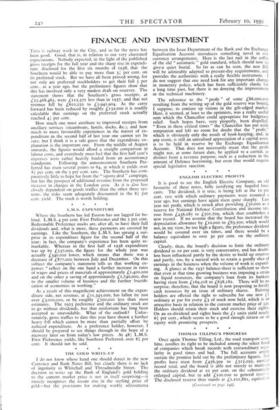ENGLISH ELECTRIC PROFITS
It is good to see the English Electric Company, an old favourite of these notes, fully justifying my hopeful fore- casts. The dividend, it is true, is being left at the 10 per cent. rate with which ordinary payments were resumed a year ago, but earnings have again risen quite sharply. Last year net profit, which is struck after providing £50,000 as a reserve for National Defence Contribution and income tax, rose from £436,185 to £501,709, which thus establishes a new record. If we assume that the board has increased the depreciation allowance by £10,000 to £63,500, which would not, in my view, be too high a figure, the preference dividend would be covered over six times, and there would be a balance equivalent to over 30 per cent. on the ordinary capital.
Clearly, then, the board's decision to limit the ordinary dividend to to per cent. is very conservative, and has doubt- less been influenced partly by the desire to build up reserves and partly, too, by a natural wish to retain a goodly slice of earnings in the business when the volume of work is expand- ing. A glance at the 1937 balance-sheet is sufficient to show that even at that time growing business was imposing a strain on liquid resources, the company's loan from its bankers having risen from £169,218 to £638,182. There will be no surprise, therefore, that the board is now proposing to fortify cash resources by an issue of ordinary shares. Existing holders are offered the right to subscribe for one new LI ordinary at par for every £3 of stock now held, which is an attractive basis in relation to the current market price of 33s. Holders should retain their stock and exercise their rights. On an ex-dividend and rights basis the £r units yield nearly 61 per cent., which seems to be a good enough return on an equity with promising prospects.














































 Previous page
Previous page